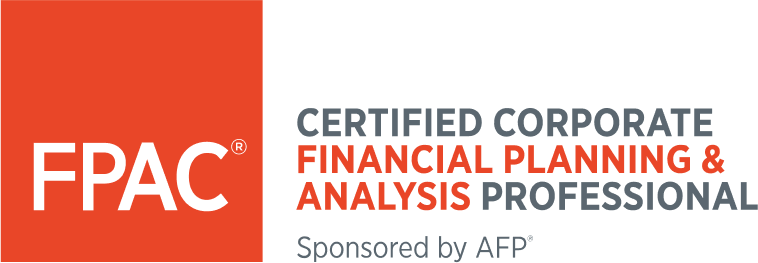Choose the Right Certification
Know the Difference: Certification vs. Certificate
When it comes to advancing your career in FP&A, it’s important to understand the difference between earning a certification and completing a certificate program. While both can enhance your skills, only one provides a globally recognized credential that validates your expertise and sets you apart.
Certification: A Recognized Credential
A certification, like the Certified Corporate FP&A Professional (FPAC), demonstrates that you have mastered industry-recognized competencies and met strict requirements, including passing an exam and maintaining ongoing professional development.
Certificate: A Learning Achievement
A certificate program provides training on a specific topic and confirms that you have completed a course. While valuable for learning, it does not require an exam or ongoing renewal and does not serve as an industry designation.
FPAC Certification | Certificate Program | |
| Industry Recognition | Globally recognized professional credential | Acknowledgment of course completion |
| Exam Requirement | Must pass a rigorous exam | No exam required |
| Work Experience | Requires work experience, giving employers confidence in your ability to perform job tasks competently | No work experience required |
| Ongoing Professional Development | Requires continuing education to maintain credential | No ongoing education required |
| Career Impact | Enhances credibility, salary potential and job opportunities | Provides additional knowledge but not a professional designation |
| Skills Validation | Verifies expertise in FP&A competencies | Demonstrates completion of coursework |
Which certification is right for you?
With so many finance certifications and certificates available, choosing the right one is essential for advancing your career and reaching your professional goals.
Earning the Certified Corporate FP&A Professional (FPAC) credential validates your expertise and commitment to:
✔ Turning strategy into action – Translating corporate and business strategy into a financial plan and driving execution through planning and resource allocation.
✔ Applying financial expertise – Leveraging modeling, scenario analysis and key performance indicators (KPIs) to guide business decisions.
✔ Becoming a trusted advisor – Building credibility and strong partnerships through effective communication and strategic insights.
The FPAC certification is the only credential built by FP&A professionals, for FP&A professionals. If you’re looking to sharpen your forecasting, analytics and business strategy skills, FPAC is the best way to elevate your career.
So Which Certification is Right for You?
For a more technical breakdown, check-out the chart below.
Certified Corporate FP&A Professional (FPAC) | Chartered Financial Analyst (CFA) | Certified Public Accountant (CPA)/ | Certificate Programs | |
| Who It’s For | Finance professionals looking to specialize in FP&A and improve forecasting, modeling and business strategy | Professionals seeking careers in investment management and research | Accountants aiming to work in financial reporting, auditing and tax | Professionals new to FP&A or transitioning into the field |
| Exam Requirement | 2-part exam | 3 exam levels | 4 exam parts for CPA | No exam |
| Study Hours Required | 80+ hours of self-study | 900+ hours of self-study | 300+ hours (CPA), 140+ hours (CMA) per part | Varies by program |
| Ongoing Education | Yes, recertification required | None, but CFA charter holders must follow ethical standards | Yes, continuing education required | No renewal required |
| Job Titles That Benefit | FP&A Analyst, FP&A Manager, Finance Director, CFO | Portfolio Manager, Research Analyst, Risk Manager, CFO | Accountant, Controller, CFO, Tax Manager | Varies by program |
Already Hold a Financial Credential?
You may be eligible to waive Part I of the exam. In order to qualify for a waiver, candidates must hold one of the following credentials active and in good standing at the time of their application: CFA, CMA, CPA (US, Canada, Australia) or CTP.
